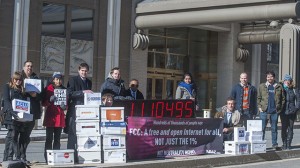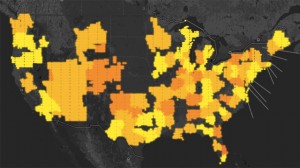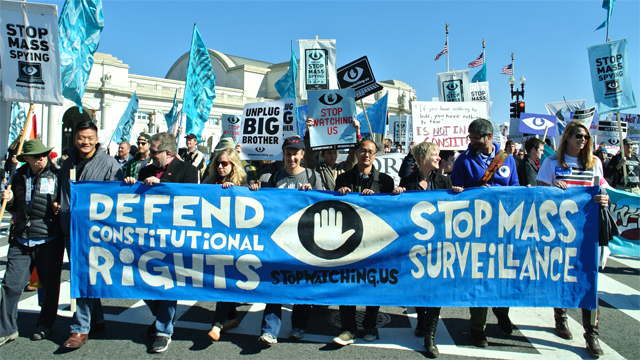Tim Karr is the senior strategist for Free Press, an advocacy organization that works to change media and technology policies, promote the public interest and strengthen democracy. He contributed this post for our “Take Action” section.
“If large numbers of people believe in freedom of speech, there will be freedom of speech, even if the law forbids it. But if public opinion is sluggish, inconvenient minorities will be persecuted, even if laws exist to protect them.”
— George Orwell
From the perspective of today’s digital age, Orwell seemed to have been clairvoyant. While our First Amendment forbids government censorship, free speech may be under more threat in 2014 than in the 70 years since Orwell penned his warning. The threat comes as much from powerful media corporations as it does from our government.
It’s this one-two punch that has mobilized millions of people to defend free speech and ensure that our laws do, too. As a handful of companies seek to become gatekeepers to all information — controlling both the content and its pipelines — this movement is fighting for everyone’s right to connect and communicate.
At the movement’s foundation is our belief that a thriving democracy requires free speech protections, an informed citizenry and a healthy and diverse media. Without better media, it’s impossible to achieve progress on any important economic, environmental or social justice issue.
The flashpoints for activism are the many failures of the existing media system. Whether it’s the silencing of dissenting views, the attacks on online privacy, the throttling of Internet access or the monopolization of choice, the problems are often rooted in bad public policy.
For decades, important decisions about the future of the media have been made behind closed doors, in conversations among regulators, members of Congress and lobbyists for the most dominant media and telecommunications companies. The needs of everyday Americans have too often been an afterthought — an inconvenience for those trying to consolidate their control over access and information.
My group, Free Press, has joined forces with hundreds of organizations to create a world where people have the information and opportunities they need to tell their own stories, hold leaders accountable and participate in policymaking.
Below are five key areas of focus in this work. Our list can’t possibly include all of the worthy groups out there, but we hope it serves as a useful starting point for anyone seeking to get involved.
1. Advancing Internet Freedom

US advocacy groups deliver more than a million signatures for a free and democratic internet to the FCC in Washington using a giant digital counter on Thursday, Jan. 30, 2014. (Photo by Kevin Wolf/AP Images for Avaaz)
The Internet is the primary engine of commercial, cultural, democratic, economic and educational innovation and exchange. It also represents the future of the news industry — and our best hope for promoting independent and diverse perspectives in our democracy.
Earlier this year, the federal appeals court in Washington, DC, struck down the Federal Communications Commission’s rules protecting Net Neutrality — the rule that keeps the Internet open, user-powered and free from blocking and discrimination.
The ruling makes it impossible for the agency to rein in the powerful phone and cable companies. In the absence of Net Neutrality protections, these companies are now free to dictate what we can view, where we can go and whom we can connect with online.
A broad coalition of groups are demanding that the FCC restores its authority to protect the open Internet. To do this, the agency needs to “reclassify” broadband Internet access as a “telecommunications service” under the law.
Unfortunately, FCC Chairman Tom Wheeler is heading in the opposite direction. In April, a proposal from the chairman to other FCC commissioners was leaked to the press. In it, Wheeler seeks to allow Internet service providers to charge an extra fee to content companies for preferential treatment, guaranteeing their content reaches end users ahead of those that do not pay.
There has been a broad public outcry against this move as a growing movement of Internet users is calling on the chairman to abandon his pay-to-play proposal and reclassify Internet access – a step that would ensure that Internet users can communicate online without fear of being censored or discriminated against by the companies that provide their connections.
Leading organizations: Access, CREDO Action, Demand Progress, Fight for the Future, Free Press, Open Technology Institute, Public Knowledge, Voices for Internet Freedom
2. Stopping Media Monopolies and Consolidation

Since the mid-1990s, four companies have been devouring local TV stations across the United States. View Free Press
In 2013, we saw more local TV station acquisitions than ever before, with companies like the Sinclair Broadcast Group using shell companies to evade the Federal Communications Commission’s (FCC) ownership limits and expand their broadcasting empires.
The FCC has recently taken the first steps to close the legal loopholes that have allowed broadcasters to combine newsrooms and air the same cookie-cutter newscast on multiple stations in the same community.
That’s just one result of activism by a coalition of public interest, labor and civil rights groups to rein in runaway media consolidation. In February, the FCC announced that it would finally abandon an agency proposal to gut a longstanding ban on owning TV stations and the daily newspaper in a single market.
Last year, we also worked with dozens of groups to stop the Koch brothers and Rupert Murdoch from taking over The Los Angeles Times and other major Tribune Company newspapers.
Even greater dangers loom in 2014: The nation’s largest cable-Internet provider, Comcast, is trying to take over No. 2 cable company Time Warner Cable. If the merger goes through, we’ll face a media colossus of unprecedented proportions and reach. But the deal can still be blocked – and a growing coalition is coming together to push the Justice Department and the FCC to stop it.
As with the fight against broadcast consolidation, the goal in blocking the merger is to promote more consumer choice through more diverse ownership of media. Whether it’s control over stations or access to digital networks, having too few media gatekeepers poses a fundamental threat to free speech.
Leading organizations: Center for Media Justice, Common Cause, Free Press, Media Mobilizing Project, National Hispanic Media Coalition, The Newspaper Guild-CWA, Writers Guild of America East
3. Defending Press Freedom
In recent years, US authorities have arrested journalists, seized their phone records and threatened them with prosecution for “aiding and abetting” whistleblowers.
Reporters, new media makers and their audiences need to become forceful First Amendment advocates. A winning press freedom coalition must include constituencies that aren’t usually invited into the debate: bloggers, union members, media reformers, civil libertarians and members of the public.
Groups are working to build public awareness by highlighting the crucial role investigative journalists play in holding those in power accountable. We’re also pushing for laws that better protect whistleblowers and shield confidential sources from over-zealous prosecution.
With more people than ever before engaged in media making, there are also more people who have press freedom. The First Amendment belongs to all of us and the public has to have a seat at the table when new laws are being debated. We must leverage public pressure to make our leaders understand what the First Amendment means in the digital age, to beat back bad laws and to support new journalistic efforts in all their forms.
Leading organizations: Committee to Protect Journalists, Free Press, Freedom of the Press Foundation, PEN American Center, Reporters Committee for Freedom of the Press
4. Protecting Personal Privacy
Since last June, when former NSA contractor Edward Snowden went public, we have learned the extent to which our government and corporations will go to spy on people and violate our civil liberties. This wholesale invasion of privacy has had a chilling effect on the freedom of expression; Internet users have lost faith in the security of the many tools we use to communicate.
Shortly after Glenn Greenwald, Laura Poitras, Barton Gellman and others published the Snowden revelations, a coalition of more than 100 groups joined forces to oppose unchecked spying and surveillance. The ACLU, Demand Progress, the Electronic Frontier Foundation, Fight for the Future and Free Press led the StopWatching.Us network, which also includes groups and individuals from across the political spectrum. Our goal is to exert real political pressure on Washington from beyond the Beltway to restore oversight of US intelligence agencies and end the culture of mass surveillance.
Many StopWatching.Us members, including Free Press, support the USA Freedom Act, bipartisan legislation that would end the NSA’s bulk collection of our phone records and require more oversight and transparency of the agency’s surveillance programs.
But this isn’t just about stopping government overreach. The private companies that track our phone calls or monitor our emails, web chats and other online activity have created giant databases that are ripe for spying and abuse. Protecting our privacy and personal data also requires a campaign to stop these companies from colluding with the government in ways that threaten free expression, privacy and public interest.
Leading organizations: ACLU, Bill of Rights Defense Committee, Center for Democracy and Technology, Electronic Frontier Foundation, Free Press, Fight for the Future, Open Technology Institute
5. Promoting Public and Community Media
For nine years in a row, the Roper Poll found that Americans across all ideological and partisan lines trust the news programming of public broadcasting the most. Yet the United States has one of the lowest-funded public media systems in the developed world and federal funding for the Corporation for Public Broadcasting is in perennial jeopardy.
There’s a disconnect between the Americans’ strong support for public media and policymakers’ attacks on NPR and PBS. Advocates routinely rally the public to protect these institutions against budget-cutting threats, but we need to begin the larger work of building a truly world-class public media system.
Leading organizations: Alliance for Community Media, Free Press, Institute for Local Self-Reliance, NAMAC, Native Public Media, Prometheus Radio Project, Protect My Public Media



